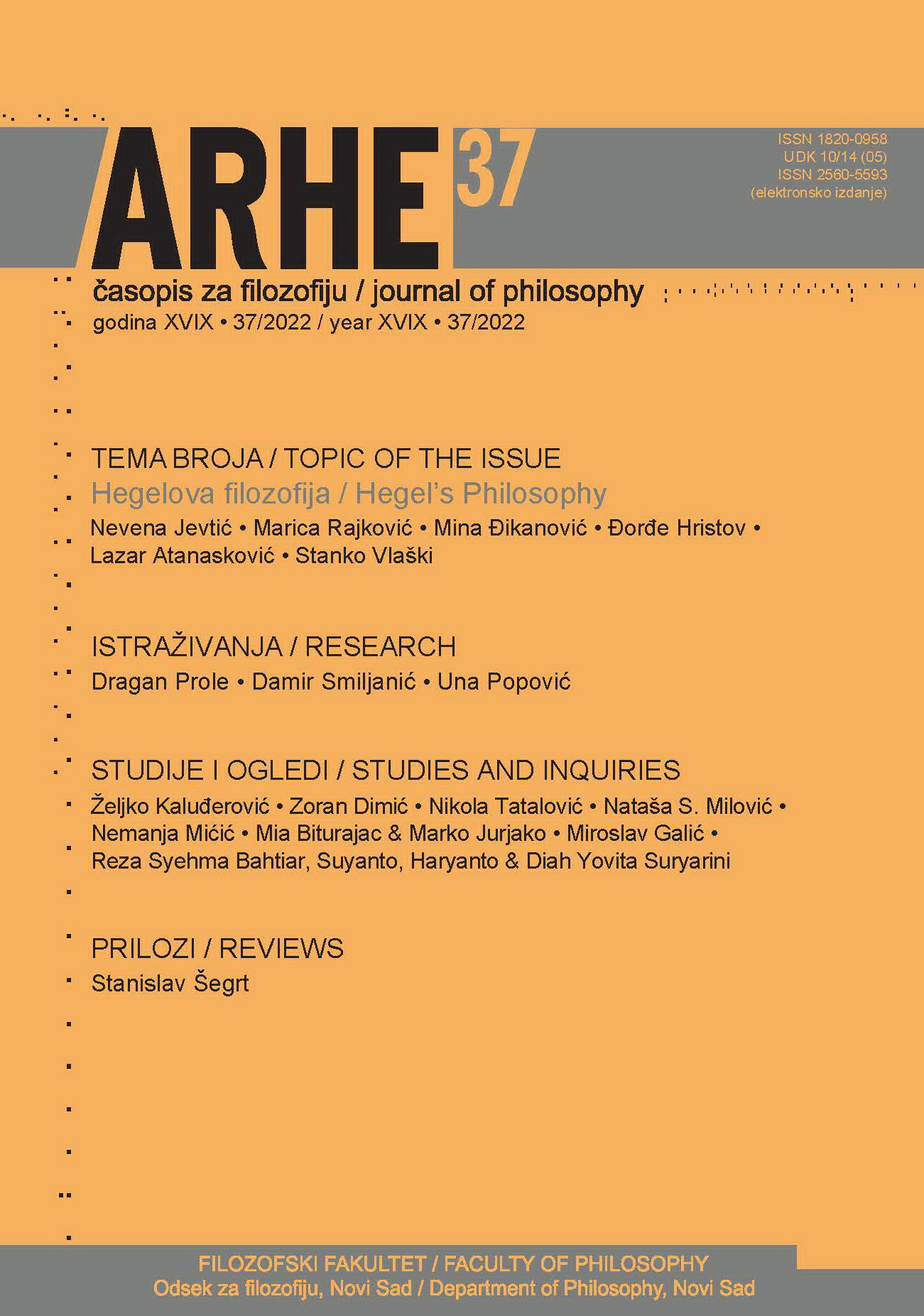VAŽNOST POJMA ŠTETE U RASPRAVI O MENTALNIM POREMEĆAJIMA
Glavni sadržaj članka
Apstrakt
Pojam štete igra važnu ulogu u raspravi o prirodi mentalnih poremećaja. Pojam štete je također prisutan u istaknutim definicijama pojma mentalnog poremećaja kako se koristi u dijagnostičkim priručnicima kao što su DSM i ICD. Međutim, nedavno su Cristina Amoretti i Elisabetta Lalumera dovele u pitanje ideju da bi šteta trebala biti nužna sastavnica mentalnih poremećaja. Tvrde da je pojam štete nedovoljno specificiran i da potencijalno dovodi do lažnih negativa u dijagnosticiranju mentalnih poremećaja. S obzirom da pojam štete igra značajnu ulogu u medicinskoj dijagnozi i liječenju, to nam ukazuje da ne bismo trebali biti skloni ukloniti ga kao kriterij za odlučivanje je li neko stanje mentalni poremećaj. Stoga se u radu argumentira da pojam štete treba shvatiti u prudencijalnom smislu te da pojam štete u tom smislu može pružiti dobar način da se odgovori na prigovore koje upućuju Amoretti i Lalumera, a da pri tom ostanemo vjerni shvaćanju pojma štete koje je relevantno za psihijatrijsku praksu.
Detalji članka

Ovaj rad je pod Creative Commons Autorstvo-Bez prerada 4.0 Internacionalna licenca.
Reference
Amoretti, C. i Lalumera, E., „Harm should not be a necessary criterion for mental disorder: some reflections on the DSM-5 definition of mental disorder“ u Theoretical Medicine and Bioethics, vol. 40, br. 4, 2019., str. 321–337.
American Psychiatric Association (APA), Diagnostic and statistical manual of mental disorders: DSM-IV, 4. izd., American Psychiatric Association, Washington, DC, 1994., str. xxi–xxii.
American Psychiatric Association (APA), Diagnostic and statistical manual of mental disorders: DSM-5, 5. izd., American Psychiatric Association, Washington D.C, 2013.
Bayer, R., Homosexuality and American psychiatry: the politics of diagnosis, Princeton University Press, Princeton, N. J., 1987.
Biturajac, M. i Jurjako, M. „Reconsidering harm in psychiatric manuals within an explicationist framework“ u Medicine, Health Care, and Philosophy, rad na recenziji.
Bolton, D., What is mental disorder? Oxford University Press, Oxford, 2008.
Boorse, C., „A second rebuttal on health“ u The Journal of Medicine and Philosophy, vol. 39, br. 6, 2014., str. 683–724.
Brzović, Z., „Duševne bolesti i rasprava o biološkim funkcijama“ u Moralni, politički i epistemološki odgovori na društvene devijacije (priredili Prijić-Samaržija, S., Malatesti, L. i Baccarini, E.), Sveučilište u Rijeci, Filozofski fakultet, Rijeka, 2016., str. 183–199.
Campbell, S. i Stramondo, J., „The complicated relationship of disability and well-being“ u Kennedy Institute of Ethics Journal vol. 27, br. 2, 2017., str. 151–184.
Cooper, R. V., „Avoiding false positives: zones of rarity, the threshold problem, and the DSM clinical significance criterion“ u The Canadian Journal of Psychiatry, vol. 58, br. 11, 2013., str. 606–611.
Cooper, R. V., „Disease“ u Studies in History and Philosophy of Science Part C, vol. 33, br. 2, 2002., str. 263–282; Wakefield, J., „The concept of mental disorder. On the boundary between biological facts and social values“ u The American Psychologist, vol. 47, br. 3, 1992., str. 373–388.
Drescher, J., „Out of DSM: depathologizing homosexuality“ u Behavioral Sciences, vol. 5, br. 4, 2015., str. 565–575.
Fiorani, M., „Rationality, irrationality and irrationalism in the anti-institutional debate in psychiatry around the second half of the 1970s in Italy“ u European Journal of Analytic Philosophy, vol. 16, br. 2, 2020., str. 101-121.
Hall, A. i Tiberius, V., „Well-being and subject dependence“ u The Routledge handbook of philosophy of well-being (priredio Fletcher, G.), Routledge, London i New York, 2016., pogl. 14.
Hausman, D. M., „Health, naturalism, and functional efficiency“ u Philosophy of Science, vol. 79, br. 4, 2012., str. 519–541.
Hooker, E., „A preliminary analysis of group behavior of homosexuals“ u The Journal of Psychology, vol. 42, br. 2, 1956., str. 217–225; Hooker, E., „The adjustment of the male overt homosexual“ u Journal of Projective Techniques, vol. 21, br. 1, 1957., str. 18–31.
Hubbard, E. M., „Neurophysiology of synesthesia“ u Current Psychiatry Reports vol. 9, br. 3, 2007., str. 193–199.
Lancellotta, E. i Bortolotti, L., „Delusions in the two-factor theory: pathological or adaptive?“ u European Journal of Analytic Philosophy vol. 16, br. 2, 2020., str. 37–57.
Loria, E., „A desirable convulsive threshold. Some reflections about electroconvulsive therapy (ECT)“ u European Journal of Analytic Philosophy, vol. 16, br. 2, 2020., str. 123–144.
Malatesti, L. i Jurjako, M., „Vrijednosti u psihijatriji i pojam mentalne bolesti“ u Moralni, politički i epistemološki odgovori na društvene devijacije (priredili Prijić-Samaržija, S., Malatesti, L. i Baccarini, E.), Sveučilište u Rijeci, Filozofski fakultet, Rijeka, 2016., str. 153–181.
Phillips, M., „Is distress a symptom of mental disorders, a marker of impairment, both or neither?“ u World Psychiatry, vol. 8, br. 2, 2009., str. 91–92.
Sackris, D., „Famine, affluence, and amorality“ u European Journal of Analytic Philosophy, vol. 17, br. 2, 2021., str. (A1)5-30.
Spitzer, R. i Williams, J. B., „The definition and diagnosis of mental disorder“ u Deviance and mental illness (priredio Gove W. R), Sage annual reviews of studies in deviance, vol. 6, Sage Publications, Beverly Hills, 1982., str. 15–31.
World Health Organization, The ICD-10 classification of mental and behavioural disorders: clinical descriptions and diagnostic guidelines, World Health Organization, Geneva, 1992.
